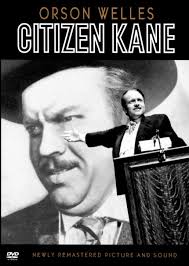A few years back there was a facebook challenge doing the rounds, to write about your favourite films, one a day for ten days. At the time I only managed to complete one day…
Here is the result…
Citizen Kane

(Directed by Orson Welles 1941)
I have watched this film many times and there are many reasons why this film makes me weep.
I first came across it as a student while studying for an Ma in Film Theory at the then Polytechnic of Central London based in Soho. Citizen Kane formed the backbone of a module on Auteur Theory, this is where the weeping starts, and doesn’t stop for two years until I abandon the course.
This protracted film drags us through the tropes and clichés that came to define the Orson Welles oeuvre. Still weeping with boredom, I note that Welles adaptation of Kafka’s The Trial also carries the same ubiquitous extended pans/zooms, dolly-shots and Atlantean sets but isn’t nearly so yawn inducing. The narrative drive of Citizen Kane is a posthumous retrospective of Kane’s life through the anecdotes of those who knew him, it circles around a central enigma: the meaning of Kane’s apocryphal last word, uttered in death-bed solitude, as he wistfully gazes into a snow globe – “Rosebud”. What is the significance of Rosebud? the narrator of the film asks, a question that has tortured film critics and film students alike for over 70 years.
My interest in the film revived briefly a few years ago when I discovered that Rosebud, along with Standing Rock and Pine Ridge, were amongst the first Reservations set aside in 1889 for the containment of and destruction of Native American peoples in Dakota. The more I read about the “Indian Wars” and the aftermath; the reservations, the forcible removal of Native American children, re-education to white ideals, and the persistent denial of Tribal land-rights (which are still going on at Standing Rock), lead me to believe Citizen Kane was a condemnation of American policy towards the First Nations. Of course, I found no evidence of this theory in the writings of film critics and theorists, and the last time I re-watched the film I really had to work hard, and turn a blind eye to huge tracts, to shoehorn the film to fit my thesis. Still, researching Native American history was rewarding, if heartbreaking, work, and it has given me more to weep and despair about than the MA in film theory ever did.
More recently I have decided that Citizen Kane was a future-shadow, a premonition of the 45th American president, and I draw solace from that image at opening of the film, imagining Donald Trump, an implausible life ending in bleak loneliness, wallowing sick in his unseemly wealth, with only a snow globe for company.

You must be logged in to post a comment.